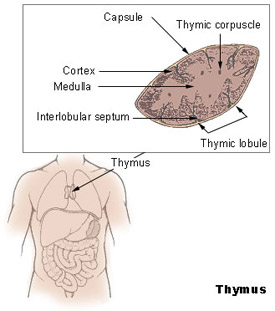Thymus

The thymus is a soft organ with two lobes that is located anterior to the ascending aorta and posterior to the sternum. It is relatively large in infants and children but after puberty it begins to decrease in size so that in older adults it is quite small.
The primary function of the thymus is the processing and maturation of special lymphocytes called T-lymphocytes or T-cells. While in the thymus, the lymphocytes do not respond to pathogens and foreign agents. After the lymphocytes have matured, they enter the blood and go to other lymphatic organs where they help provide defense against disease. The thymus also produces a hormone, thymosin, which stimulates the maturation of lymphocytes in other lymphatic organs.
Suggested Citation
SEER Training Modules: Thymus. U.S. National Institutes of Health, National Cancer Institute. Cited 27 February 2026. Available from: https://training.seer.cancer.gov.




